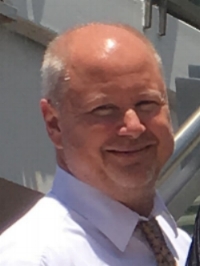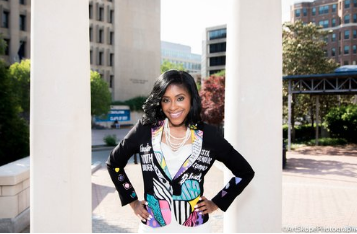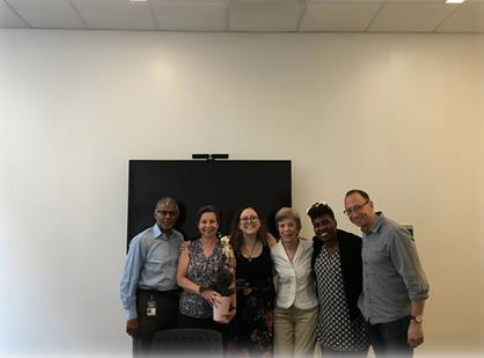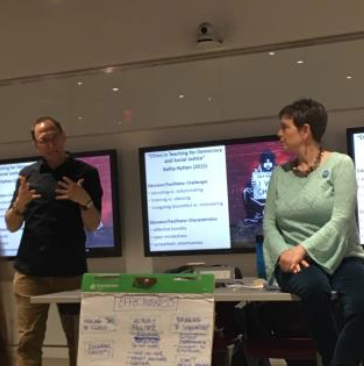 Dr. Cleary is a Nashman Affiliated Faculty member and an epidemiologist in GW's School of Public Health.
Dr. Cleary is a Nashman Affiliated Faculty member and an epidemiologist in GW's School of Public Health.
Bianca Trinidad, a Nashman Center Course Guide spoke with Dr. Cleary about his work.
"My research over the past almost 10 years here at GWU has involved community groups. They have been interventions focused on trying to improve adolescent health, such as positive youth development, so interventions designed within those frameworks. Therefore, that is in line with what I am doing now. My current work is more focused on not just adolescents but also the transition from adolescence to young adulthood, and more specifically - I’ve been working with a group of non-speaking, autistic young adults. And that has been the structure for the development of a new service learning course and hopefully, future research within this area."
Tell us about the Adelante intervention project.
"The intervention was implemented in Langley Park, Maryland, and the target population was new immigrants from Central America. The goal of the intervention was to provide positive environments to improve what Lerner identified as the five C’s of positive youth development, which are competence, connection, confidence, character, caring, and a sixth, contribution back to the family and community. So, there were many components to the intervention - all of these folders on the shelves behind me represent different components! They all were designed to capitalize on improving the PYD constructs."
Which one did you find the most interesting?
"What I feel was most effective were the family dinners, and these family dinners were intended to engage parents as advocates for their families and in the community, and that could involve a lot of things--from having to deal with the school system to having to deal with health care providers--it was a wide range. But what it really did was provide a network for families who just got into the United States to A) have a network for support, but B) to also have a network to go to if they needed information about anything. And it included the GWU research team. There was an office in Langley Park staffed by our community partner, the Maryland Multicultural Youth Center, and included a great team of case workers. They helped do all this on the ground level. Personally, I thought that the family dinners were one of the most fun aspects of the intervention that had the potential for a long-term impact. You can imagine if you don’t speak the language, you’re new to the community, it would be difficult to navigate daily life. There are many things we take for granted, especially if you’ve lived here your whole life - in terms of how to interact with the school, the police, healthcare providers. Those are all real life everyday issues that people have to negotiate, and so, I think that the family dinners were definitely very positive. And so, the parents that were engaged in this parents-as-leaders program really became leaders in the community. I mean, they really wanted to continue working with the Adelante team, which was really great. Photovoice was another intervention that an epidemiology doctoral student at the time, Idalina Batista Cubilla, PhD, took the lead on. It was a way for kids to document what it’s like to grow up in Langley Park, which was wonderful. Staff at MMYC also produced a telenovela from the adolescents perspective in the community - was pretty effective as well. It gave a snapshot of what it’s like to grow up in Langley Park as a teenager, and some of the issues. What we were really focusing on were violence prevention, substance abuse prevention, and reducing sexual risking-taking behavior. So, those were the broader issues. The issue with affecting change in those outcome areas is that it takes a lot longer than within the 5-year grant period that we were given. So anyway, back to the question, I definitely do think that the family dinners was the most positive activity within the intervention.
What inspired you to start this intervention?
"I live near there and so does Mark Edberg, PhD, who is in the Department of Prevention and Community Health, in the Milken Institute School of Public Health, and is the Principal Investigator of the Avance Center. So, this was a study within the Center. We both were seeing what was happening in Langley Park and wanted to do something about it. We started working in Langley Park in 2005 with a CDC funded study, and then we got this larger NIH fund P20 grant."
Were there any other challenges or surprises that came out of doing the study?
"Whenever you’re doing work within a community, things take longer than you might expect. There is a certain level of trust and it has to be built up. I think that the Adelante Intervention was successful, because we’d been there for 5 years before, and so, we were a known entity. Before that, we didn’t have a brand as we do now. And that brand, Adelante - the name and the logo - was developed by youth in the community. So, I think in everything that we’ve doing, we’ve tried to incorporate community input. One of the reasons why the intervention was so accepted in the community was that the community had a hand in developing what we were doing and had a say in it. And that’s what I’m trying to bring into what I’m working on now with the group of non-speaking autistic young adults. They’re going to be involved in the course I am teaching next semester. They’ve been reviewing my syllabus and giving me ideas on what I should and shouldn’t cover. So, I’m using the same framework, just in a different community right now."
That seems like such a great upcoming course, can you tell us more about it?
"It was developed with a community. It’s a service-learning course, and so, the students in the class will be volunteering at a number of places. SPARC is an educational program for anyone with a developmental disability, and growingkids Therapy Center is specifically for children and young adults with autism. This group of young adults, they call themselves The Tribe, are well-known advocates for the non-speaking autistic community. So what I’m trying to do with this course is to introduce GWU students to the community to encourage and facilitate engagement. This idea first came to me a year and a half ago when I went to a conference that was focused on non-speakers, and I was talking to young adults and their families. A similar course was being offered at UVA, Charlottesville, and it was very successful. But Tribe members said, “We live up here. So, can you do something here at GWU?”, because by proximity, it’s easier. And they’ve been wonderful in terms or giving me feedback on not just the content, but on how the course should be run. And, they will be coming to some of the classes. Out of a semester of 15 classes, I think some are going to come to all, and the larger group will be there for at least five classes. The reason behind this is that we’re hoping to get more collaboration between the students in the course and people in the community. The goal is in order to understand the needs of the community, Tribe members need to be involved in the course, and we need to hear from them about what resources and services they need – their feedback should not only be driving our services, but also our research as well. And so, the Tribe members will actually be involved in discussing with us what’s next. There’s both a service-learning component to the course, as well as a research component. So, the classes are a mix of science, viewpoint, and community engagement. We are going to cover the science of autism as it related specifically to this transition from young adult to adulthood. But, we’re also going to get classes that will have people from the community, their parents and siblings, as well as practitioners to give some voice to their experience with this population. And then, we’re going to have a number of classes with experts from inside and outside of GWU speak about their research. So, I’m very excited about it. It’s interdisciplinary, with faculty from the Milken Institute School of Public Health, Columbian College, the School of Education, and Children’s National Health Services. Faculty from across the university are going to contribute to the course, and everyone who I’ve approached has been excited about being involved in the course."
"And the best thing is - I was visiting growing Therapy Center on Monday to go over the syllabus with the young adults, and they are very excited about the course as well. They are just excited to be coming to campus and to be involved in something like this. And, the key is that they will be involved. They have been actively involved from the very beginning, and I want to respect that. The ultimate goal is to inspire students in the course to go into this field and whether they go into the field to become health care or service providers for people with autism or they become researchers in the field. The service learning is going to give them an opportunity to volunteer at the centers that do phenomenal work at providing educational resources and activities for these young adults communities that have aged-out of our current educational system. We’re going to be focusing on key issues that everyone experiences when transitioning from adolescence to young adulthood, and that includes further education, employment, independent living and interpersonal relationships. These are all issues that everyone deals with. We’re just experiencing this through the lens of autistic young adults, and more specifically, non-speaking autistics, which again does not mean that they cannot communicate. In the beginning of the course, the students will learn about the different methods non-speakers use to communicate. So, many of the young adults communicate through using letter boards. Others use keyboards, and others have developed their speaking ability so that they can answer independently without much assistance from a communication specialist."
I’m really excited for the future of this course and all that it has to offer. Why do you think it is important for GW faculty to be engaged in community-engaged scholarship?
"It falls under what many of us do in public health and what we call “community-based participatory research”. It’s not as effective when we just enter a community that we don’t belong in and try to affect change from the outside. You’re going to meet a lot of problems. And any time it’s new, like, when we first started at Langley Park, there were issues, like, “Who are you--coming into our community?” And still, in the current environment, there are issues, because people are less willing to open their door when we send someone to do a survey, for obvious reasons. But because we’ve been in the community for a while, and we’ve done good work for the community and people recognize the logo, they know who we are. So, that’s how we can affect the greatest amount of change. And that’s what I’m trying to do with this course as well. If we’re going to be able to affect change into the community, the community has to be involved in the research from the very beginning. And so, that’s why it’s important to do something like this from both the service-learning and community-engagement as it relates to research as well."
"One of the nice things about putting together a course like this is that I get to meet faculty from across the university from several departments that have similar interests. It has been very exciting to hear that they’re excited about the course as well. I’m trying to make it as interdisciplinary as possible. The young adults from the community who are going to be joining us are not coming for only a few classes just to have the students get to know them. They want to talk to the researchers as well, and they want to give their feedback to clinicians as well, about how they’re treated. So, I think this interdisciplinary perspective is really important both for the community and for learning about the community and their experiences. It’s been great to meet other faculty within the university.
Any other projects that you would like to highlight?
"I’m excited to move into this other area and new community group and apply the same principles. But hopefully the 2nd and 3rd time around, things will go a lot faster. I know it’s not instantaneous. I went to this conference a year and a half ago, but I’ve known people in this group for years before that. So, it takes time to gain trust from people in the community, and rightfully so. There are a lot of people that are protecting members of this community in particular. As a researcher, you must remember and respect that and try to demonstrate some level of authenticity that you are really going to be working in their best interest and with them included. When I do my next research project, I hope members of the community will be research staff on the project. When I put together a paper about the development of this course, they will be co-authors on this paper, because they helped with the development of this course. Inclusion like that I think are important for the community and for us, as researchers. I’m hoping that the students who take the class will understand that feel empowered to get more involved. If they get that, I will be satisfied. There’s a lot of stuff to learn, but it’s also about the experience and the process. If the students can take what they get out of the course and use it towards their career, that is what’s most important."
We want to thank Dr. Cleary for taking the time to talk about his work with us. Learn more about the Nashman Affiliated faculty.












 Dr. Cleary is a Nashman Affiliated Faculty member and an epidemiologist in GW's School of Public Health.
Dr. Cleary is a Nashman Affiliated Faculty member and an epidemiologist in GW's School of Public Health.




